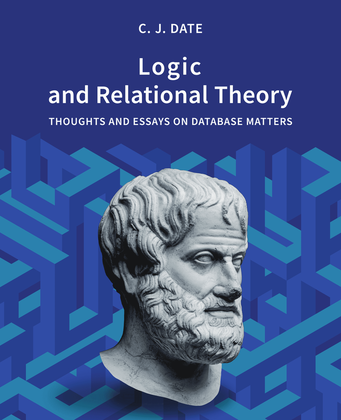|
Normally I don't do book reviews on this blog but for this one, I thought I'd make an exception. After all, it's not every day I encounter a book that tackles topics like Logic head-on, without getting all abstract and theoretical. This book not only manages to remain practical but also gives a good overview of the topic of logic, something that every data professional can benefit from. Note that this book is on the subject of data modeling, which although related to data science, is its own field and is concerned with databases, as well as the design of such systems.
First of all, the book provides an excellent introduction to Logic, without getting too mathy about the topic. When I was looking into Ph.D. topics, I briefly considered doing my research on this subject. However, I quickly dismissed it because it was too abstract and theoretical. This book addresses this point and presents the subject in a very practical way, making it relatable and interesting. This is something it manages by providing a connection between Logic and databases, with plenty of examples. This enables the reader to maintain a practical viewpoint across the different topics covered in the book and view logic as a useful tool. What’s more, the author does a pretty good review of other books on the subject with a robust criticism of their strengths and weaknesses. In a way, it feels like reading a bunch of books, getting the gist of their approaches, without having to go through their text. It is evident that the author knows the subject in great depth, something that he exhibits through his approach on the subject, which is also quite distinct. For example, he provides a great analysis of topics that weren't covered properly elsewhere such as that of integrity. Also, the author provides lots of references for each topic at the end of each chapter, making the whole book feel a bit academic in that sense, but without the rigid style that characterizes such books. However, for someone who wishes to explore the various topics further, this list of relevant resources at the end of each chapter can be quite handy. Moreover, the book is fairly easy to understand even for non-experts in data modelings or logic. This is important since it’s not common to find a technical book that’s accessible to non-experts in the topic. This book, however, seems to have a very broad audience, even people who know very little about the subject. Finally, there are lots of definitions of key concepts and a scientific approach to the subject overall. This is also not very common since not all technical books are written by scientists. Also, many people nowadays write a book based on their experience and empirical knowledge on a subject. This book, however, was written in a scientific manner, even if it doesn't have the typical academic style. So, if you are interested in buying this book, you can do so directly from the publisher. Also, if you were to use the code coupon DSML you can get a 20% discount, making this purchase a bargain. Note that this code applies to other books available at the Technics Publications site, including some of the webinars.
0 Comments
Your comment will be posted after it is approved.
Leave a Reply. |
Zacharias Voulgaris, PhDPassionate data scientist with a foxy approach to technology, particularly related to A.I. Archives
April 2024
Categories
All
|

 RSS Feed
RSS Feed